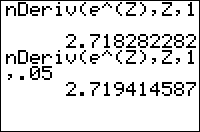TI-BASIC:Nderiv: Difference between revisions
Initial automated import |
KermMartian (talk | contribs) No edit summary |
||
| Line 33: | Line 33: | ||
The exact formula that the calculator uses to evaluate this function is: | The exact formula that the calculator uses to evaluate this function is: | ||
<math> | |||
\operatorname{nDeriv}(f(t),t,x,h)=\frac{f(x+h)-f(x-h)}{2h} | \operatorname{nDeriv}(f(t),t,x,h)=\frac{f(x+h)-f(x-h)}{2h} | ||
</math> | |||
(.001 is substituted for h when the argument is omitted) | (.001 is substituted for h when the argument is omitted) | ||
| Line 48: | Line 48: | ||
* [[TI-BASIC:Fmin|FMin(]] | * [[TI-BASIC:Fmin|FMin(]] | ||
* [[TI-BASIC:Fmax|FMax(]] | * [[TI-BASIC:Fmax|FMax(]] | ||
* [[TI-BASIC:Fnint|FnInt(]][[Category:TI-BASIC]] | * [[TI-BASIC:Fnint|FnInt(]] | ||
[[Category:TI-BASIC]] | |||
[[Category:TIBD]] | [[Category:TIBD]] | ||
Latest revision as of 19:17, 24 February 2016
Command Summary
Calculates the approximate numerical derivative of a function, at a point.
Command Syntax
nDeriv(f(variable),variable,value[,h])
Menu Location
Press:
- MATH to access the Math menu.
- 8 to select nDeriv(, or use arrows.
TI-83/84/+/SE
1 byte
nDeriv(f(var),var,value[,h]) computes an approximation to the value of the derivative of f(var) with respect to var at var=value. h is the step size used in the approximation of the derivative. The default value of h is 0.001.
nDeriv( only works for real numbers and expressions. nDeriv( can be used only once inside another instance of nDeriv(.
π→X
3.141592654
nDeriv(sin(T),T,X)
-.9999998333
nDeriv(sin(T),T,X,(abs(X)+e-6)e-6)
-1.000000015
nDeriv(nDeriv(cos(U),U,T),T,X)
.999999665
Advanced
If the default setting for h doesn't produce a good enough result, it can be difficult to choose a correct substitute. Although larger values of h naturally produce a larger margin of error, it's not always helpful to make h very small. If the difference between f(x+h) and f(x-h) is much smaller than the actual values of f(x+h) or f(x-h), then it will only be recorded in the last few significant digits, and therefore be imprecise.
A suitable compromise is to choose a tolerance h that's based on X. As suggested here, (abs(X)+E-6)E-6 is a reasonably good value that often gives better results than the default.
Formulas
The exact formula that the calculator uses to evaluate this function is:
<math> \operatorname{nDeriv}(f(t),t,x,h)=\frac{f(x+h)-f(x-h)}{2h} </math>
(.001 is substituted for h when the argument is omitted)
Error Conditions
- ERR:DOMAIN is thrown if h is 0 (since this would yield division by 0 in the formula)
- ERR:ILLEGAL NEST is thrown if nDeriv( commands are nested more than one level deep. Just having one nDeriv( command inside another is okay, though.
